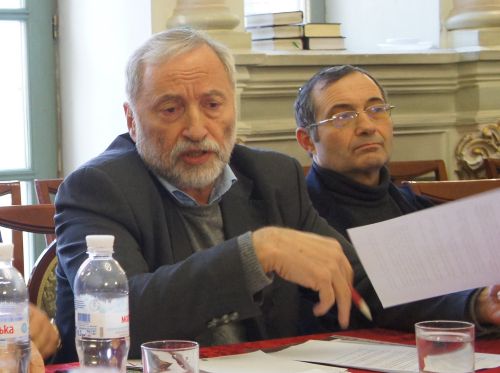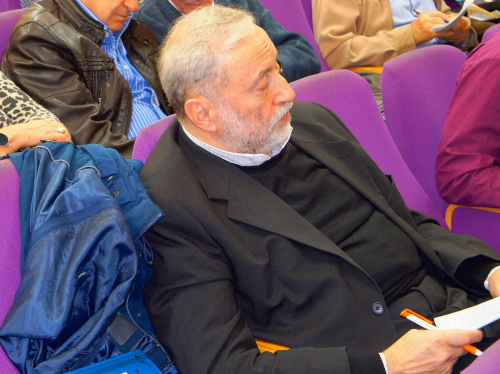Josef Zissels: A Ukrainian Jewry Is Being Created
 Josef Zissels, the head of the Association of Jewish Organizations and Communities of Ukraine, visited Israel at the beginning of March 2017. In a special interview with the Ukrainian Jewish Encounter, he responded to questions on the formation of a new Jewish identity in Ukraine.
Josef Zissels, the head of the Association of Jewish Organizations and Communities of Ukraine, visited Israel at the beginning of March 2017. In a special interview with the Ukrainian Jewish Encounter, he responded to questions on the formation of a new Jewish identity in Ukraine.
Josef, how do your two identies—the Jewish-Zionist and the Ukrainian—co-exist?
This is an absolutely normal development and a well-known phenomenon of dual identity. The French and American Jews have it, for example. It is a normal reaction in the Diaspora.
In the beginning of the 1990s you signed the "The Jerusalem Program" whereby Israel and Jerusalem are the center and heart of the Jewish people. How is this integrated with your Ukrainian patriotism? In other words, how should these two identities, in your opinion, be ideally integrated?
An ideal is not achieved by a declaration. Ukraine is now attempting to find a new identity for itself. She is trying to cast off a Eurasian identity, and is trying—as many countries which escaped from the Russian-Soviet empire—to find the path to Europe. Nobody returns to Russia voluntarily. This can only be done by force. Russia, for example, forced back into the Eurasian orbit Armenia, due to the latter's difficult situation in the South Caucasus region.
If Ukraine is wise enough to accept some American influence on its identity, then we will be like American Jewry. But I think most likely the Bulgarian Jewish community option will be adopted. These are European residents, patriots of Bulgaria, who are ready to support Israel spiritually and materially. For example, we from Ukraine recently carried out the planting of trees in Israel.
In the Ukrainian mass media the formation of a political nation is advocated by two people—Josef Zissels and Vitaly Portnikov. But are Ukrainians themselves ready to accept Jews into their political nation? Are Ukrainians in general ready to accept such a concept as the political nation?
The creation of a political nation is an objective process and does not depend on the desire of politicians or civil society. It is a process of building a new objective reality. I don't think that in contemporary conditions it is possible to build an ethnic state. A more realistic process is the formation of a political nation in which citizens of different ethnic origins preserve their ethnic and religious culture, but at the same time are patriots of their country.
This doesn't depend on the desires of radical nationalists. They can dream about whatever, but history marches on. A political and state-based nation includes different ethnoses and groups. An ethnically-based nation is advocated by those rare nationalists who have no influence in Ukraine. They are absolutely marginalized and have no influence on any processes. They are not in the political mainstream, and most likely won't be.
 For many years you have been preparing documents for the restitution of Jewish communal property in Ukraine. Are there any developments on this topic?
For many years you have been preparing documents for the restitution of Jewish communal property in Ukraine. Are there any developments on this topic?
There are no developments. We managed in the twenty-five years of independence to return about sixty properties—mostly synagogues—to the Jewish communities. But there is no fundamental law on restitution. I joke that in the mind of a Ukrainian parliamentarian the idea of restitution does not fit either lengthwise or crosswise or vertically.
Plus the fear that "foreign Jews will come and take away all the property which belonged to them earlier."
This is not about the return of private property. This property is an even more serious problem. I consider it necessary to set aside this topic when there is a war and an economic crisis, when Russia wages war against Ukraine. It is necessary to survive this war, to improve the economy, and then later return to this topic when there are already more positive conditions.
In your opinion, has a single post-Soviet Russian-speaking Jewry continued to exist in the twenty-five years since the collapse of the USSR?
Even Soviet Jewry was heterogeneous. The Georgian, Bukhara, and Mountain Jews weren't as assimilated as the Jews of Moscow, Leningrad, and Kyiv. There was Western Ukraine, where an ethnic Jewish culture remained. There were general factors—state antisemitism and the hidden sympathy of Soviet Jews for Israel. Since then the USSR, fortunately, collapsed, and Jews began to feel as Jews of the new independent countries.
Elderly people however bear within themselves an identity as Soviet Jews. But the youth change quicker together with the people among whom they live. And here we saw them on the Maidans. We see them now at the front. The Ukrainian Jews are already here. They are no longer "Jews of Ukraine," the intermediate stage between Soviet and Ukrainian Jews.
The more Ukraine discovers itself and creates an identity of the Ukrainian political nation, the more Ukrainian Jews and other minorities will be integrated. We are living here according to the general laws of the transformation of identity.
Text and photo: Shimon Briman (Israel).



















